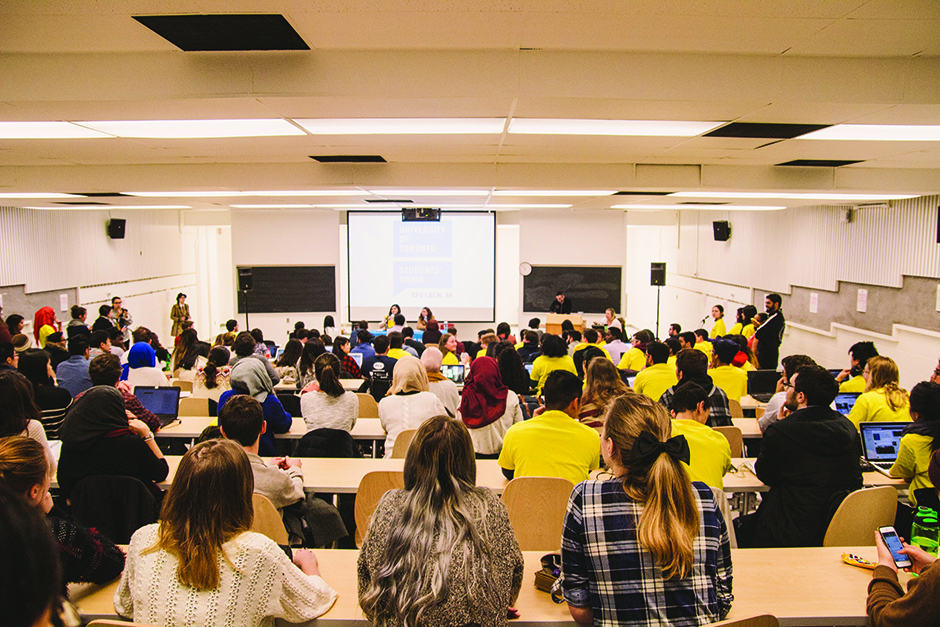All-candidates debate full of promises, with plans often absent
The University of Toronto Students’ Union (UTSU) Executive Candidate Forum on March 19 opened to a slow start, with vacant chairs where the candidates from the incumbent Change UofT slate should have sat. The moderator had finished outlining that “general rules of decorum would apply.” Punctuality, it seemed, was not included.
Once the debate began, however, it was a surprisingly substantive and often heated evening. Questions posed by students ranged from addressing tuition fees, sexual violence on campus, and communication and accountability in student government.
Lobbying was unsurprisingly the answer to most questions. The most concrete plan of the evening was brought forward by Brighter UofT’s Jasmine Denike who responded to a question about tuition fees with a detailed plan including measures to lower the current debt cap. Agape Amponsah-Mensah highlighted the extent of the issue and emphasized the year’s success with flat fees, but failed to articulate any clear plans for the future.
Where Amponsah-Mensah was emphatically clear was in her focus on ensuring the protection of minority voices and groups, particularly in her eloquent response to a controversial question regarding resources allocated to campaigns on Aboriginal student rights and issues.
Although inclusivity became a focus of the evening, policy issues came into play as well. A question regarding approaches to establishing faculty policies like “drop credit” — used to drop the lowest mark off a student’s transcript — gave the VP university affairs candidates an opportunity to showcase their knowledge. Vere Marie Khan proposed a plan to work closely with the faculties while Xinbo Zhang admitted that he was not sure how best to tackle the issue.
Candidates articulated their platforms well, generally providing direct answers to questions. The most notable exception occurred during the VP internal and services debate when Grayce Slobodian, Change UofT candidate and current VP external at the UTSU, responded to a question regarding the disparity between allocated funds for UTSU salaries and the audited figure by skirting the issue and citing confidentiality.
Slobodian’s opponent, Ryan Gomes from Brighter UofT, seized the opportunity to highlight his dedication to transparency, emphasizing in response to the same question that students deserve to know when and why budget lines change.
Both presidential candidates faced pointed questions from the audience, which they took in stride. Unfortunately, both candidates provided weak plans for improving commuter life and community integration on campus, focusing on the importance of the Student Commons.
Where Change UofT’s presidential candidate Cameron Wathey celebrated the success of the recent movement on the commons, his competitor Ben Coleman approached the issue cautiously. In his response, Coleman provided a more structured plan for providing the building and ensuring the effective use and management of the space.
In an evening that saw the debate veer on and off course, the candidates answered questions to varying degrees of success. For those with burning questions, there is still time before voting begins on March 24. Bearing in mind the significance the election could have on student life at U of T, it may be wise to ask — and to remember that substantial plans matter more than platform promises.
Samantha Relich is The Varsity’s features editor. She is a fourth-year student at Victoria College studying criminology and political science.
Passing over of financial concerns reflects poorly on the incumbency
With charges of sexism being thrown around freely and an opposition supporter being dubbed racist for their question at the debate, one could say it has been quite the UTSU race thus far.
In politics, things like this are called noise. Disturbances such as these can sway the election, but they’re just distractions. Somewhat lost in all the chaos, however, is a very serious issue about the UTSU’s finances.
The issues over the UTSU’s budget were brought to a head when VP internal candidates Grayce Slobodian of Change UofT and Ryan Gomes of Brighter UofT revealed some of the union’s troubling financial details. It seems that the UTSU overspent its salaries budget by a serious amount. Furthermore, the original budget projected a substantial surplus while the UTSU audit revealed that, in actuality, the union ran a deficit.
If true, this suggests that the UTSU has been horribly mismanaged over the past year. Slobodian’s response, that she couldn’t discuss the issue for reasons of confidentiality, is deeply troubling. It is a very real issue in a campaign filled with noise, and it seriously calls into question the current structure of the UTSU.
Both slates have promised to better administer the UTSU. Just about every candidate who ever ran for office has made a similar promise. The question is whether the UTSU can function under the current system. Two structural issues call this into doubt.
Every year the UTSU sends a chunk of student fees to the Canadian Federation of Students (CFS). The CFS uses these fees to fund its own administration and engage in politics. U of T students who pay these fees see almost no benefit. Change UofT, the CFS-backed slate, should clarify whether and why it accepts an endorsement from this organization. Brighter UofT should also clarify what it plans to do about the CFS if elected.
The second drag on UTSU efficiency is more local. We have an undergraduate student union that represents students at two of three campuses; that is absurd. Both slates have promised that the UTSU will work for UTM students even though the vast majority of its constituency and its main office are located here on the St. George campus.
In the debate, Grayce Slobodian dodged the question about finances; Ryan Gomes simply stated it was the incumbent’s problem. Anyone who wants to be VP of the UTSU should explain how they plan to fix the financial disaster here on campus. That is what really matters in this race, and the candidates should focus on fixing the UTSU — not petty politics.
Jeffrey Schulman is a second-year student at Trinity College studying classics.


